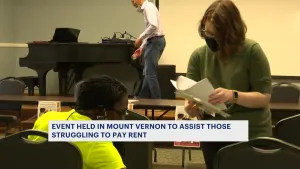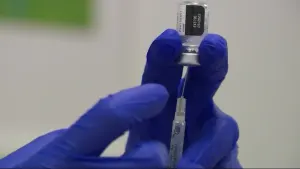More Stories
For the general public, the Centers for Disease Control and Prevention recommends wearing gloves when you are cleaning or caring for someone who is sick.
In most other situations, like running errands, wearing gloves is not necessary. Instead, health officials say practice everyday preventive actions like keeping social distance from others, washing your hands with soap and water for 20 seconds, or using a hand sanitizer with at least 60% alcohol, and wearing a cloth face covering when you have to go out in public.
When, and when not to wear gloves:
1. Wear gloves when you are routinely cleaning and disinfecting your home:
Follow precautions listed on the disinfectant product label, which may include wearing gloves (reusable or disposable) and having good ventilation by turning on a fan or opening a window to get fresh air into the room you’re cleaning.
Follow precautions listed on the disinfectant product label, which may include wearing gloves (reusable or disposable) and having good ventilation by turning on a fan or opening a window to get fresh air into the room you’re cleaning.
Wash your hands after you have removed the gloves.
2. Wear gloves when caring for someone who is sick:
If you are providing care to someone who is sick at home or in another non-health care setting, use disposable gloves when cleaning and disinfecting the area around the person who is sick or other surfaces that may be frequently touched in the home.
If you are providing care to someone who is sick at home or in another non-health care setting, use disposable gloves when cleaning and disinfecting the area around the person who is sick or other surfaces that may be frequently touched in the home.
Use disposable gloves when touching or having contact with blood, stool, or body fluids, such as saliva, mucus, vomit, and urine.
After using disposable gloves, throw them out in a lined trash can. Do not disinfect or reuse the gloves.
Wash your hands after you have removed the gloves.
3. When gloves aren't needed:
Wearing gloves outside the above instances (for example, when using a shopping cart or using an ATM) will not necessarily protect you from getting COVID-19 and may still lead to the spread of germs. The best way to protect yourself from germs when running errands and after going out is to regularly wash your hands with soap and water for 20 seconds or use hand sanitizer with at least 60% alcohol.
Wearing gloves outside the above instances (for example, when using a shopping cart or using an ATM) will not necessarily protect you from getting COVID-19 and may still lead to the spread of germs. The best way to protect yourself from germs when running errands and after going out is to regularly wash your hands with soap and water for 20 seconds or use hand sanitizer with at least 60% alcohol.
Other ways to protect yourself:
COVID-19 is a respiratory virus and is mainly spread through droplets created when a person who is infected coughs, sneezes, or talks. You can protect yourself by keeping social distance from others and washing your hands with soap and water for 20 seconds, or using a hand sanitizer with at least 60% alcohol, at key times, and practicing everyday preventive actions.
COVID-19 is a respiratory virus and is mainly spread through droplets created when a person who is infected coughs, sneezes, or talks. You can protect yourself by keeping social distance from others and washing your hands with soap and water for 20 seconds, or using a hand sanitizer with at least 60% alcohol, at key times, and practicing everyday preventive actions.
More from News 12
0:23

New Excelsior Pass Plus app extends beyond New York jurisdiction
2:06

Mount Vernon hosts rental assistance program as NY eviction moratorium deadline looms

State-run COVID-19 vaccine facility at Marist College will administer 3,500 doses over 6 days

Your Coronavirus 2020 Photos

Yonkers organization offers free Thanksgiving meals to seniors
